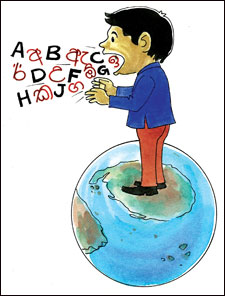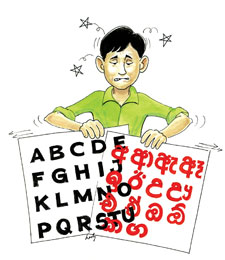|
Mind your quirky language:
Verbalization blues
Aditha Dissanayake
Who is to blame if certain English
words have become an integral part of our day to day vocabulary? There
is surely no crime in not asking someone hima kiranak kamuda” or
suggesting “yathuru padiyen yamu da”. “None at all” says award winning
poet and popular columnist, Buddadasa Galappaththi. He believes code
switching is not a “mega issue” so far as the listener comprehends what
is being said.
“Now hear this!” the postcard begins. “The use of an English word
when conversing in Sinhala or Tamil is a pretentious and altogether
lamentable affectation”. The writer continues in this baroque manner for
several more sentences, and concludes, “You will of course accept my
view in this matter in good part and will never again switch from one
language to another , at least in public, and thus oblige.” The card is
signed, “Your most humble petitioner, XX, Chairman, Ad Hoc Committee for
Stamping Out Language Mixing”.

The postcard and the Committee are imaginary right now. But at the
rate English words are invading the Sinhala and Tamil languages, a
movement ought to begin soon, protesting against what linguists call
“code switching”.
In case you don’t call it that, “code switching” is that “act”
bilingual types perform when they are having a conversation, with their
colleagues or cousins or a close friend, in Sinhala or Tamil, by
inexplicably switching to English, then switching back to their mother
tongue again. (i.e “When you have time, mata call karanna”, train eka
late una, ada stock market down da? idi fix pannanga, game karan, nalla
idea etc)
Unintentional
For the bilingual, code-switching is, undoubtedly, business as usual.
For the monolingual, though, who overhear them as they jabber into their
mobile phones at public places like the supermarket (“Holiday season eke
mara choice ekak”) or at Galle Face esplanade (greenary eka sea ekath
ekka blend wenawa) it can, undoubtedly be infuriating.
Yet, code switching continues, mostly unintentionally. Who is to
blame if certain English words have become an integral part of our day
to day vocabulary? There is surely no crime in not asking someone hima
kiranak kamuda” or suggesting “yathuru padiyen yamu da”.
“None at all” says award winning poet and popular columnist,
Buddadasa Galappaththi. He believes code switching is not a “mega issue”
so far as the listener comprehends what is being said. Who would
understand me if I said “Mama three roda rathayaka awa” instead of
saying “mama three wheel ekaka awa”, or “dahathun wana kathangaya
baluwada” instead of “dahathun wana episode eka baluwada” he asks and
adds “In my candid opinion there is no harm at all in using English
words in day to day conversations”. He laughs, “Mawa quote karanna, no
problem. Uputa dakwanna kiwuwoth therenne na ne”.
 Yet,
like Professor Kusuma Karunaratne,Former Head of the Department of
Sinhala, University of Colombo, Galappaththi too abhors hearing
presenters of radio and tv channels using English words when there are
perfect Sinhala equivalents. He believes Sinhala presenters on radio and
tv can easily avoid phrases like “kumbura experience karamu” or “next
segment ekata yamu”, while Professor Karunaratne, feels, by frequently
switching from Sinhala to English we are aping the Indians who
constantly sprinkle Hindu sentences with English words. Yet,
like Professor Kusuma Karunaratne,Former Head of the Department of
Sinhala, University of Colombo, Galappaththi too abhors hearing
presenters of radio and tv channels using English words when there are
perfect Sinhala equivalents. He believes Sinhala presenters on radio and
tv can easily avoid phrases like “kumbura experience karamu” or “next
segment ekata yamu”, while Professor Karunaratne, feels, by frequently
switching from Sinhala to English we are aping the Indians who
constantly sprinkle Hindu sentences with English words.
“If you speak in Sinhala, speak only in Sinhala” she advises and
hopes the media would take note when they present programmes in Sinhala.
Her consternation is justified when one hears tv and radio show hosts
and hostesses perhaps in their attempts to show off their knowledge of
English do the opposite and reveal how little they know; they see
nothing wrong in saying “thanks karanna awa”, or “comedy character ekak
act karanawa”.
This is the main contention Wasanthi Nanayakkara, News Manager at
Derana TV, too, has against the use of English words when speaking in
Sinhala. Saying she herself never uses an English word in her programs
if she could help it she says announcers who switch to English every now
and then in their presentations should make sure before the programme,
the English words they use are grammatically correct.
“There are certain words like station and post office that are a part
of the Sinhala vocabulary now” says Nanayakkara. “But there are other
English words which we can easily avoid. By sticking to the English word
and ignoring its Sinhala equivalent we distort our mother tongue. This
is unpardonable”. Things are no different in the Tamil language.
Subashini Padmanadan, newspaper columnist and author of seven books
written in the Tamil language says on most radio and tv channels
presenters constantly switch from Tamil to English mainly to show off
their knowledge of English. She is worried if this trend continues
certain Tamil words will disappear from the vocabulary all together.
Horrendous
Perhaps no other media personality opposes code switching on radio
and tv as veteran journalist Tilak Kuruwita Bandara. “Media personnel
should stick completely to the language their programs are conducted in;
(i.e if it is a Sinhala programme speak only in Sinhala, if its a Tamil
program speak only in Tamil).
It is horrendous the way presenters who are neither proficient in
Sinhala nor English have mixed the two, willy nilly, and created a
nonsensical language for which they have to be thoroughly reprimanded?
Yet, in spite of such heavy disapproval the print and electronic
media continue to dish out a fizzy mix of Sinhala, Tamil and English.
“Ada customers la demand karanne X brand eke underwear” goes a radio
advertisement followed by words and sentences like “hotma hot, loan ekak
ganna enna, set wemuda”.
On a weekend, going through the Sinhala newspapers or listening to
popular radio and tv channels you are bound to pick phrases like “comedy
movie ekak produce wela, strangers la ekka fun ekak ganna, impress
karanna, or try karala balanna.” If you are lucky you might even catch
the “remix pora” who comes up with the classic warning, in case you are
thinking of going out for a drive, “No joking, na parking”. Heed his
advice, stay at home and watch some more tv.
Enter Talk Show Hostess (turning to a young man, long hair, pants
torn at the knees, heavy necklaces, reminiscent of Mr. T’s jewelry):
“End eke monawada kiyanna kamathi”?
Young man: “Mm...kiyanna kamathi....(Cut. The scene shifts without
warning to several advertisements ranging from herbal concoctions for
the common cold, to plastic pipes, to milk powder, to hair dye). When
you have almost forgotten everything about the skinnier version of Mr.
T, he appears with his last words. “Mata kiyanna thiyenne...mmm,
well...actually, life eka jeevath wenna ona”.
Hostess: “Right. Hariyatama hari. Thank you.” (turns to the viewers).
“Next week, same time meet wemu. Don’t forget. Sure ne”.
Feel quirky? Over to you Mr. Chairman, Ad Hoc Committee for Stamping
Out Language Mixing? Hope you will not be imaginary for far too long.
[email protected]
|



